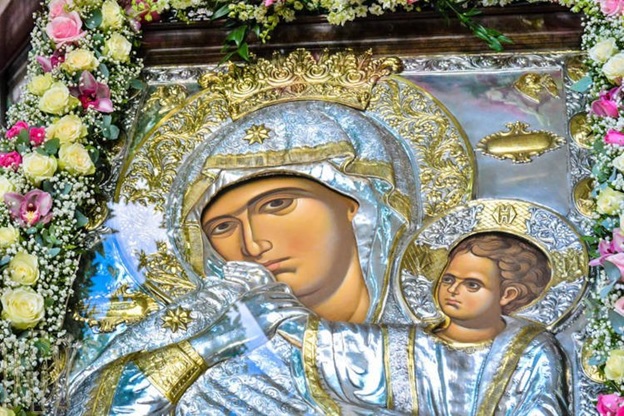‘I lie now on a bed of infirmities…’
9 August 2023Pain, sickness and death were not initially part of human nature, as this was created by God. They’re the product of the ancestral sin. This is why, in order to abolish these consequences of sin, Jesus ‘went about doing good works and healing’ (Acts 10, 38), providing cures for the ailments of soul and body. The hymnographer who wrote the [small] supplicatory canon, lifts his voice and cries: ‘I lie now on a bed of infirmities and there is no healing for my body’. He continues by addressing our sweetest Lady, ‘who bore God, the Savior of the world and healer of our infirmities’. He entreats her: ‘I pray you, of your goodness, raise me out of my decrepitude’.
Invoking divine assistance doesn’t obviate recourse to medical science; it’s right and proper that they should coexist. This is why the word of God teaches us: ‘Honor physicians with the honor due to them… The Lord ordained that medicinal plants should grow from the earth; those who are wise do not reject them…He has given people skill, so that he might be honored in his marvelous works. With such [herbs and physicians] God heals and takes away sick people’s pain’ (Wisdom of Sirach, 38, 1-8). While not ignoring medical assistance, we should also pray that God will illumine doctors in their task.

The trial of sickness is such a shock to us because it’s a threat to our continued biological existence. We don’t know the cause of the illness, its progression is uncertain and this unsettles us. We look for answers, but, like Job, we know that God has control of everything that happens in our life. We don’t know why God has permitted sickness to visit us, but we do know that there’s no way God will ever abandon us. A modern Orthodox theologian, Tito Colliander tells us: ‘You should consider that everything you encounter on your way forward, large or small, is sent by God in order to assist you in your struggle. He alone knows what’s good for you’.
The meaning of pain and sickness is to be found in the mystery of the Cross of Jesus Christ, who experienced the most excruciating and unwarranted pain. Without the Cross, pain is terrifying and incomprehensible. Through the Cross, however, it becomes a means of salvation because, as the late Elder Efraim Filotheïtis teaches us, pain purifies the soul and makes it humble, charitable and good, thus paving the way for divine visitation. This is why the hymn-writer of the [small] supplicatory canon necessarily links cure of the body with healing of the soul from the passions and with spiritual progress and perfection: ‘you heal the wounds of my soul and the pains of my body, Virgin full of grace, so that I may praise you’.
The poet entreats our lady: ‘In your mercy, all-praised Mother of God, take heed of the hardships of my body and heal the pain of my soul’, because he recognizes her as an ‘inexhaustible treasury of remedies’. And, indeed, the healing miracles performed by our Lady for the sick are innumerable. A few years after the miraculous discovery of the wonder-working icon of our Lady of the Myrtles, on Kythira, a paralyzed man wanted to visit the blessed site where the icon was found, on the day of its feast (24 September), in order to venerate it. He was carried there on a stretcher by some people from his village, Suddenly the place was thrown into turmoil and confusion because rumor had it that pirates had invaded the area. Panic followed and everybody there started to run away to safety. The paralyzed man then raised his arms in prayer to the Mother of God, begging her to protect him from the pirates. Suddenly he heard a voice, telling him to get up and leave. He obeyed the voice, stood up straight and began to run for safety. The others from his village were amazed that the former invalid had become well and they glorified our Lady.
Let us imitate that paralyzed man and raise our arms to our Lady and entreat her to grant us the cure of our body, but, more particularly, to heal our soul which has been paralyzed by sin. Supported by repentance, let us rise up from the notional bed of sin and the passions and let us run the course of virtue and sanctity, so that we’ll be able to enter the kingdom of heaven.






